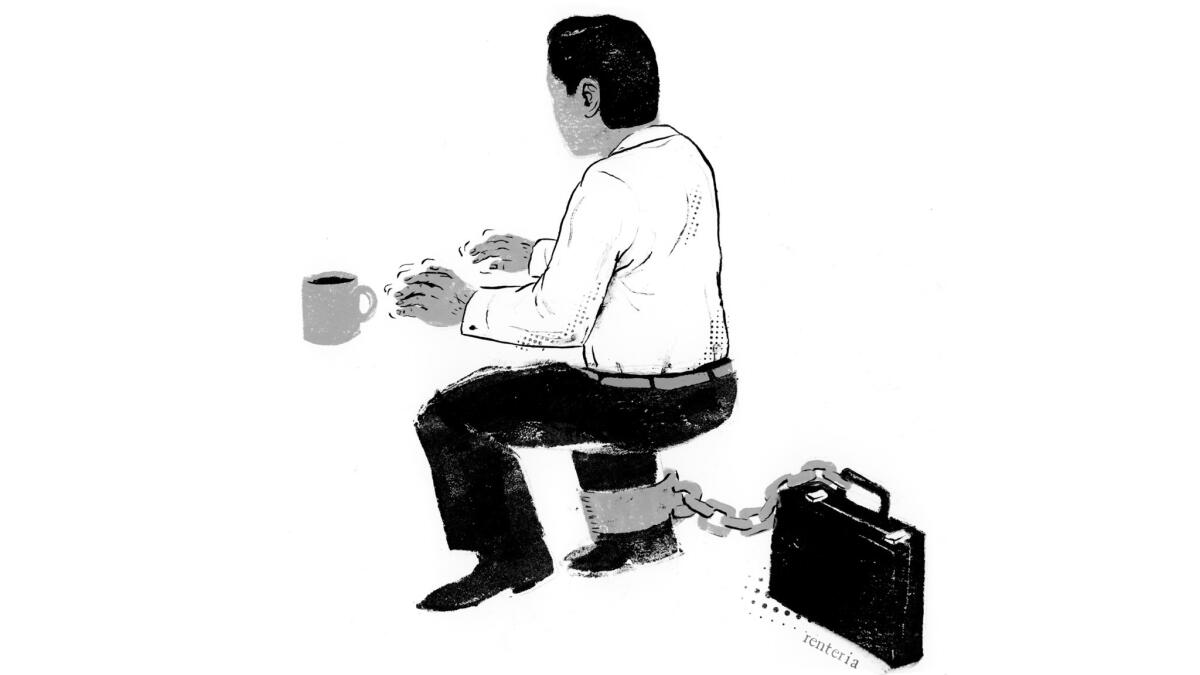Op-Ed: America, say goodbye to the Era of Big Work

- Share via
For much of the past century, the Era of Big Work — the 40-hour workweek and its employer-provided benefits — were the foundation of our economy. That was then. Now, independent work is the new normal.
Freelancers, independent contractors and temp workers are on their way to making up the majority of the U.S. labor force. They number 42 million, or one-third of all workers in the nation. That figure is expected to rise to 40% — some 60 million people — by the end of the decade.
A number of factors both economic and cultural are causing the independent workforce to swell. Technological advances and globalization have greatly contributed to the erosion of traditional work arrangements. The private sector’s need for speed and adaptability is increasingly incompatible with maintaining a large, full-time workforce. And of course, the Great Recession has put to rest the notion that there is such a thing as a stable full-time job.
It’s true that many have been forced into this brave new world of freelance work by external factors. But many are getting into it by choice because independent work aligns with a paradigm shift in values that is happening both at work and in the marketplace.
Nearly 9 in 10 workers affiliated with Freelancers Union, a 250,000-member nonprofit, say they wouldn’t return to traditional work if they had the choice. This sentiment is especially true for millennials, who will make up 75% of the workforce by 2025 — and who work and consume differently than generations before them.
Success during the Era of Big Work meant promotions, benefits packages and pensions. Americans went to work at 9 a.m. and left at 5 p.m. — OK, let’s be honest, 6 or 7 p.m. — primarily for the material rewards that flowed from such employment: a new car, robust benefits, a three-bedroom house and two weeks of paid vacation. For the past century, in other words, remuneration defined success. For many workers, it still does.
However, among the growing ranks of independent workers, labor itself is increasingly its own reward, as is the opportunity to establish a work-life balance that was unthinkable during the Era of Big Work. Millions of freelancers are working when they want and how they want. They’re building gratifying careers but also happy lives. And they’re helping build a support system so they can live the lives they want.
Yes, the comfort of a regular paycheck is gone, but it’s replaced by other, arguably greater comforts: a flexible schedule, the sense of ownership and pride that comes with being one’s own boss, the ability to prioritize health and wellness in ways that are incompatible with traditional employment structures.
A recent survey from the freelancer hiring hub Elance-oDesk found an overwhelming 89% of freelancers prefer work flexibility to a traditional corporate career. Almost half of millennials prioritize job flexibility over pay, according to a national survey conducted last year by Millennial Branding, a research and consulting firm, and Beyond.com, a career advisory website.
As a result, the way Americans think about work is changing, and so is the way they spend money. Millennials in particular have reimagined the very idea of ownership and fueled the rise of conscious capitalism. Four out of five are more likely to put their purchasing power toward companies that support a cause they care about, according to a 2011 study by Participant Media.
Some argue that millennials don’t buy big-ticket items because they can’t afford them — for instance, the number of cars purchased by the 18-to-34 demographic fell almost 30% between 2007 and 2011. But that’s only one factor in a much larger equation.
In reality, millennials tend to value experiences more than things. Their consumption habits are driven less by what kind of job they have and more by their pursuit of ever-evolving technology, brands that align with their ideals and sustainable and social purpose purchasing.
From what we buy to how we work — and why we do either — the American economy is undergoing a change every bit as epic as the shift a century ago from an agrarian society to an industrial one. When workers left the farm for the factory, there were, undoubtedly, plenty who mourned the loss of the old way of life, while others eagerly looked to the next era with vision and enthusiasm. The same is true today.
Some view freelancing as a short-term path to return to the well-worn avenue of Big Work. Meanwhile, others are eagerly embracing collaborative consumption and various digital platforms — such as Etsy and Airbnb — that have enabled the freelance economy to proliferate.
Despite the tremendous changes in our economic landscape, Washington is all but ignoring the broader economic implications, as evidenced by the failure of the Bureau of Labor Statistics to even track independent workers, much less adapt to their economic needs.
Freelancers, on the other hand, aren’t just learning to adapt. Many are thriving in this new marketplace, creating powerful new platforms for working and living — co-ops, credit unions, community health and wellness centers — tailor-made for millennial technology and the 21st century economy.
The Era of Big Work is indeed over, and good riddance. Welcome to the Era of Meaningful Independence.
Sara Horowitz is the founder and executive director of Freelancers Union, a national labor group representing the new workforce.
Follow the Opinion section on Twitter @latimesopinion
More to Read
A cure for the common opinion
Get thought-provoking perspectives with our weekly newsletter.
You may occasionally receive promotional content from the Los Angeles Times.










